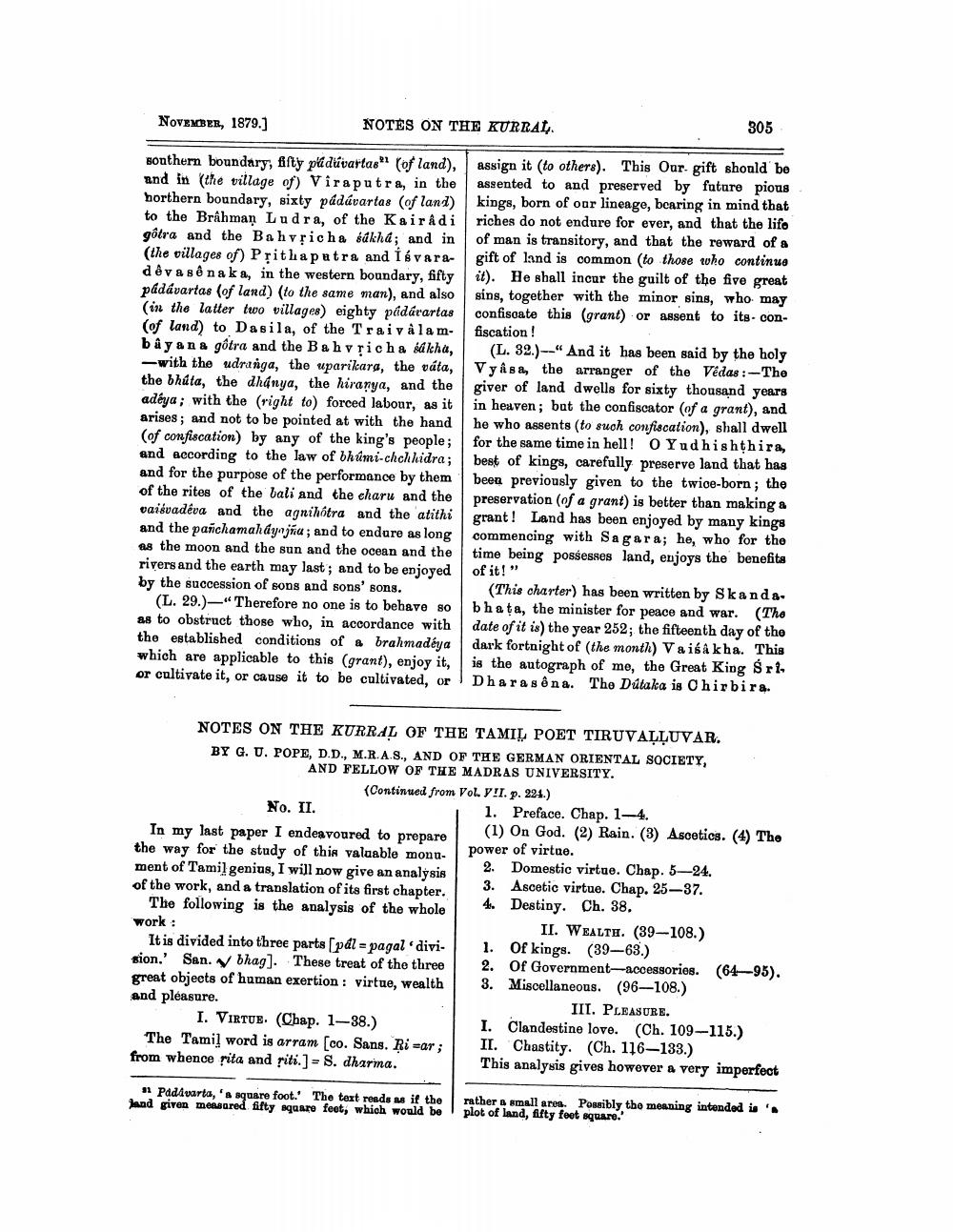________________
NOVEMBER, 1879.]
NOTES ON THE KURRAL
305
sonthern boundary, fifty plédúvartas"? (of land), and in the village of) Viraputra, in the horthern boundary, sixty pádávartas (of land) to the Brahman Ludra, of the Kairadi gôtra and the Bah vộicha śákhd; and in (the villages of) Prithaputra and I svaradev a sê naka, in the western boundary, fifty padávartas (of land) (to the same man), and also (in the latter two villages) eighty padarartas (of land) to Dasila, of the Trai valambây an a gôtra and the Bah vộicha ódkha, -with the udranga, the uparikara, the váta, the bháta, the dhanya, the hiranya, and the adéya; with the right to) forced labour, as it arises; and not to be pointed at with the hand (of confiscation) by any of the king's people; and according to the law of bhúmi-chchhidra; and for the purpose of the performance by them of the rites of the bali and the charu and the vaisvadeva and the agnihotra and the atithi and the pañchamah dynjia; and to endure as long as the moon and the sun and the ocean and the rivers and the earth may last; and to be enjoyed by the succession of sons and sons' sons.
(L. 29.)—"Therefore no one is to behave so as to obstruct those who, in accordance with the established conditions of a brahmadéya which are applicable to this (grant), enjoy it, or cultivate it, or cause it to be cultivated, or
assign it to others). This Our gift should be assented to and preserved by future pious kings, born of our lineage, bcaring in mind that riches do not endure for ever, and that the lifo of man is transitory, and that the reward of a gift of land is common to those who continue it). He shall incur the guilt of the five great sins, together with the minor sing, who may confiscate this (grant) or assent to its confiscation !
(L. 32.) --" And it has been said by the holy Vyasa, the arranger of the Vedas :-The giver of land dwells for sixty thousand years in heaven; bat the confiscator (of a grant), and he who assents (to such confiscation), shall dwell for the same time in hell! O Yudhishthira, best of kings, carefully preserve land that has been previously given to the twice-born; the preservation (of a grant) is better than making a grant! Land has been enjoyed by many kings commencing with Sagara; he, who for the time being possesses land, enjoys the benefits of it!"
(This charter) has been written by Skanda. bha ta, the minister for peace and war. (The date of it is) the year 252; the fifteenth day of the dark fortnight of (the month) Vaisakha. This is the autograph of me, the Great King Srl Dharasê na. The Dútaka is Chirbira.
NOTES ON THE KURRAL OF THE TAMIL POET TIRUVALLUVAR. BY G. U. POPE, D.D., M.R.A.S., AND OF THE GERMAN ORIENTAL SOCIETY,
AND FELLOW OF THE MADRAS UNIVERSITY.
(Continued from Vol. Y!I. p. 224.) No. II.
1. Preface. Chap. 1-4. In my last paper I endeavoured to prepare
epare (1) On God. (2) Rain. (3) Ascetics. (4) The the way for the study of this valuable mona. power of virtue. ment of Tamil genius, I will now give an analysis
2. Domestic virtue. Chap. 5—24. of the work, and a translation of its first chapter.
3. Ascetic virtue. Chap. 25-37. The following is the analysis of the whole
4. Destiny. Ch. 38. work:
II. WEALTH. (39-108.) It is divided into three parts (pdl = pagal divi- 1. Of kings. (39-63.) sion.' San. v bhag]. These treat of the three 2. Of Government-accessories. (64—95). great objects of human exertion : virtue, wealth 3. Miscellaneous. (96-108.) and pleasure.
IIT. PLEASURE. I. VIRTUE. (Chap. 1–38.)
I. Clandestine love. (Ch. 109-115.) The Tamil word is arram [co. Sans. Ri=ar; II. Chastity. (Ch. 116-133.) from whence fita and siti.] - S. dharma.
This analysis gives however a very imperfect
11 Pada warta, 's square foot. The text reads us if the had given memared fifty square feet, which would be
rather & small ares. Possibly the meaning intended is ' plot of land, fifty feet aquare.'




